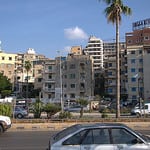UK urges travelers to avoid all but essential travel to Lebanon

Skift Take
Days after Lebanon was ready to sue an American TV series for an unfair portrayal of its capital city, a car bomb exploded and demonstrations over took the city leading to a drop in tourism that the country badly wanted to avoid.
A car bomb exploded in the Achrafieh district of Beirut on Friday, killing eight people, including a senior intelligence official, prompting violent protests this weekend in Beirut, Tripoli and Sidon.
[caption id="" align="alignright" width="350"] The updated travel advisory will lead to a drop in tourism i
